Lydia Caprani, Blind Portraits

01 |
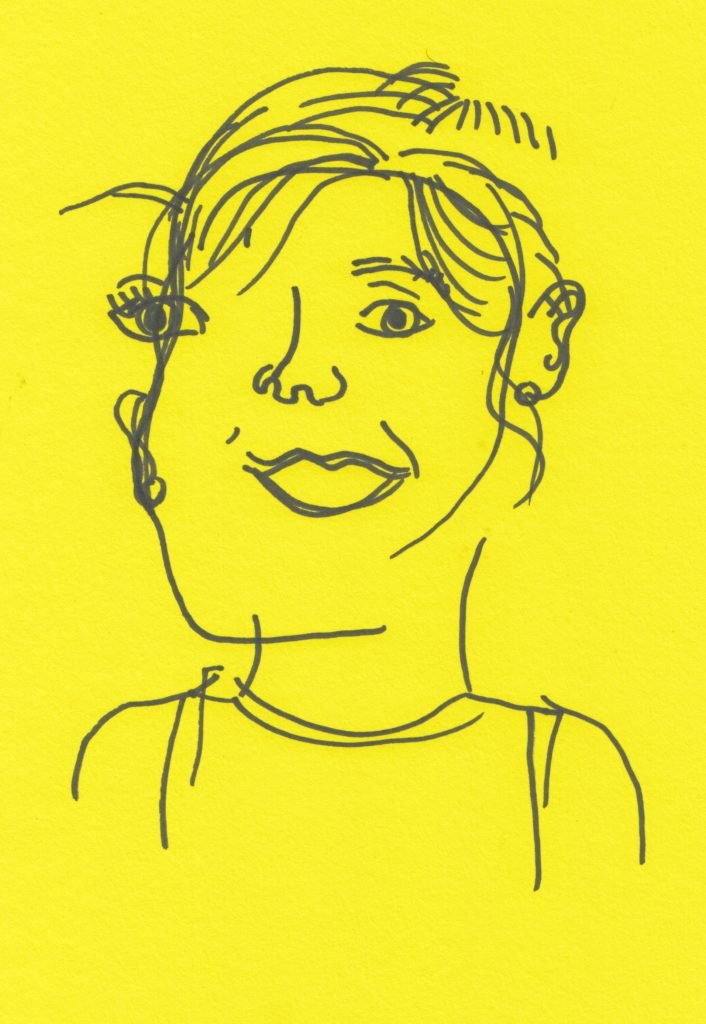
02 |
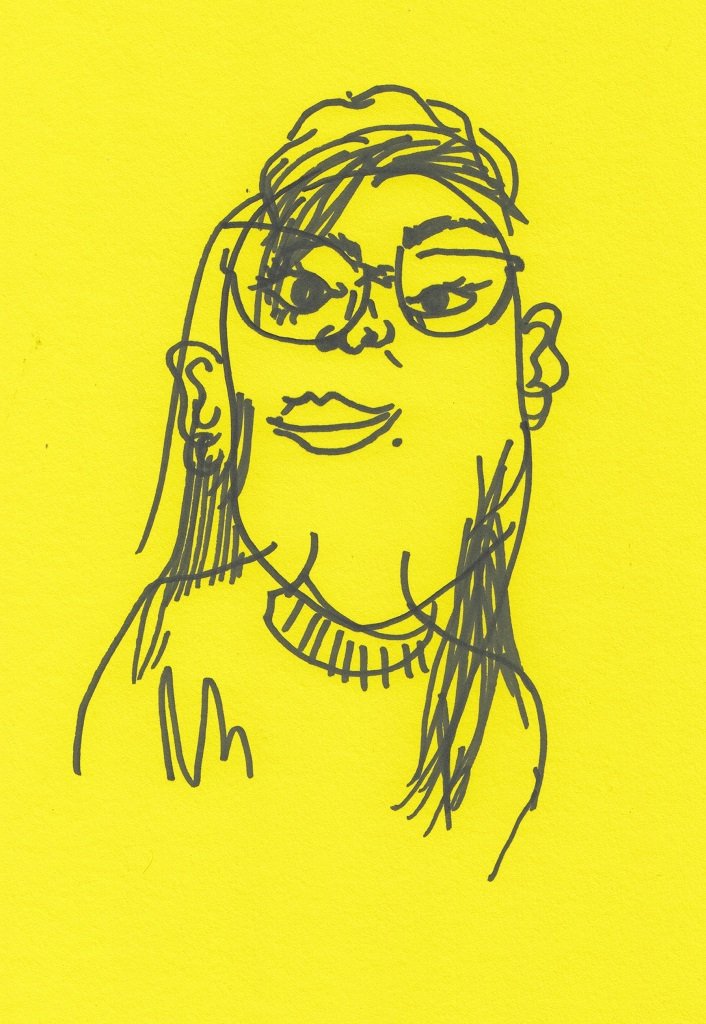
03 |
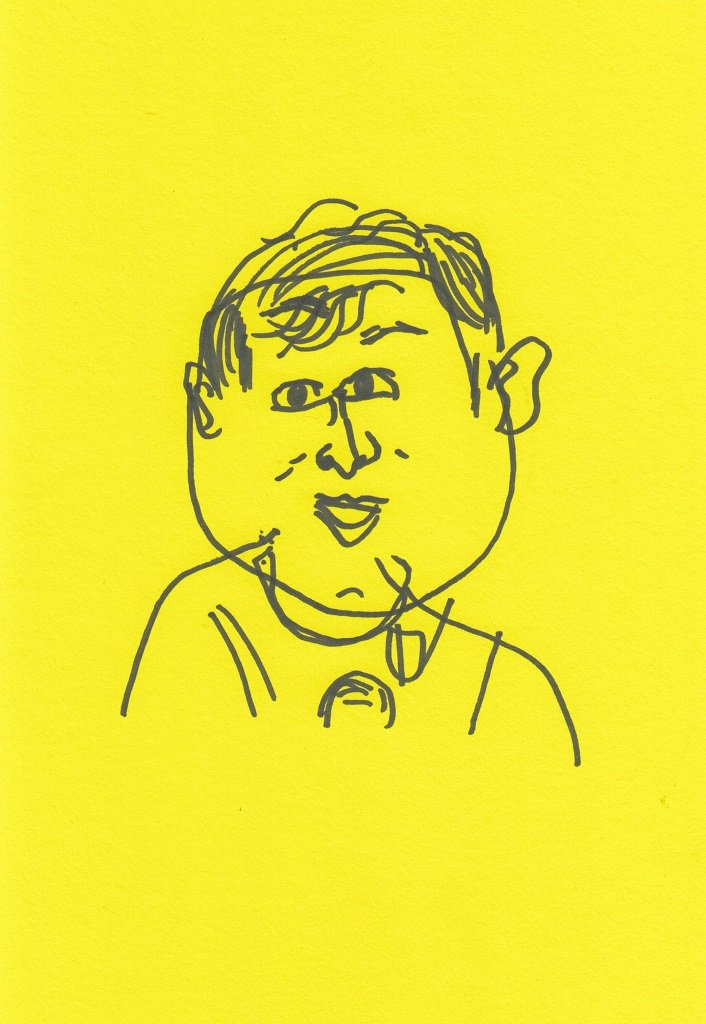
04 |
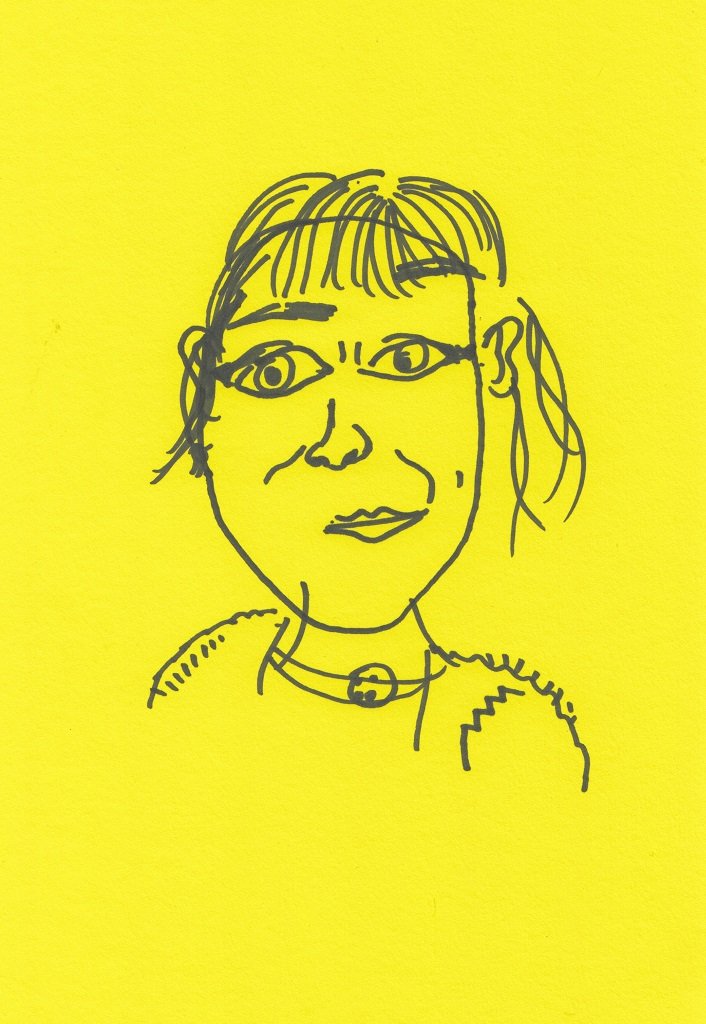
05 |
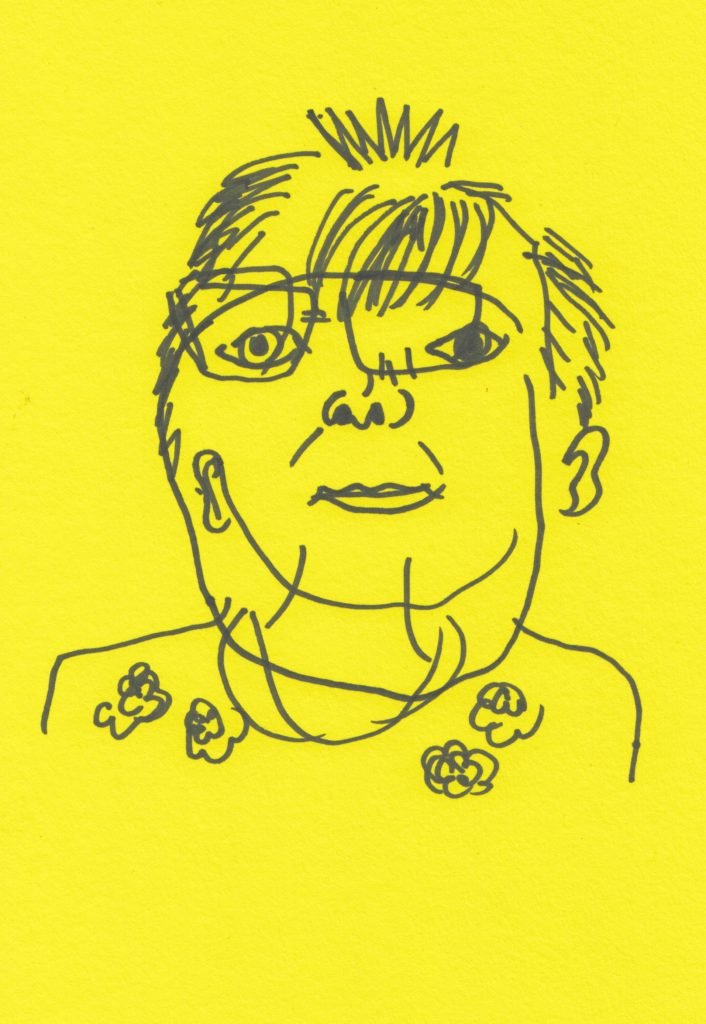
06 |
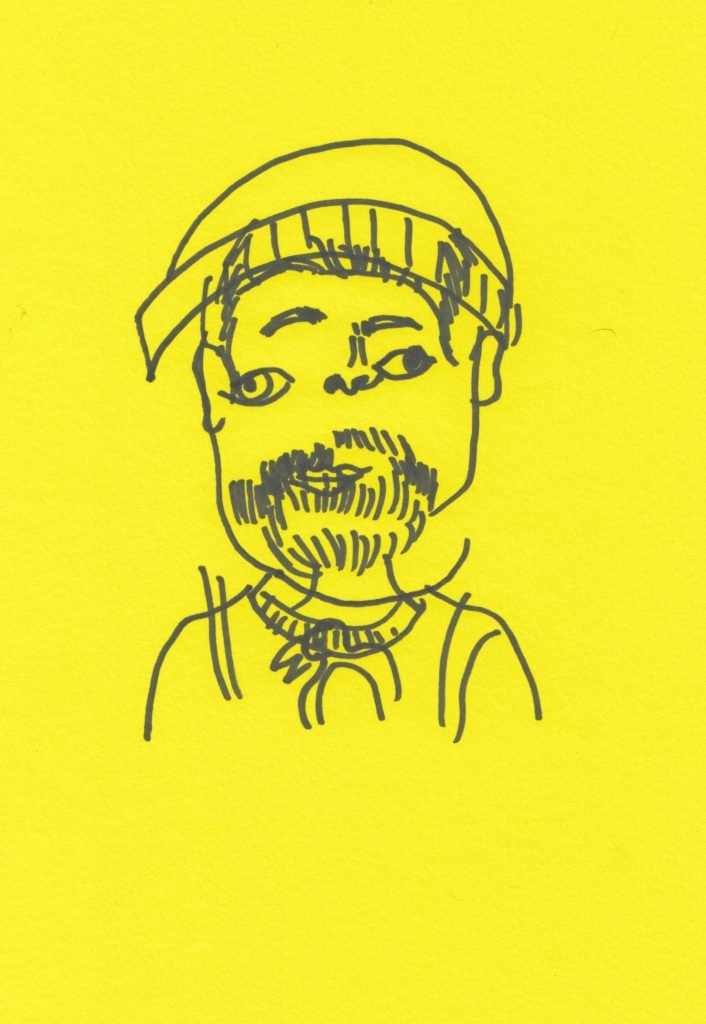
07 |
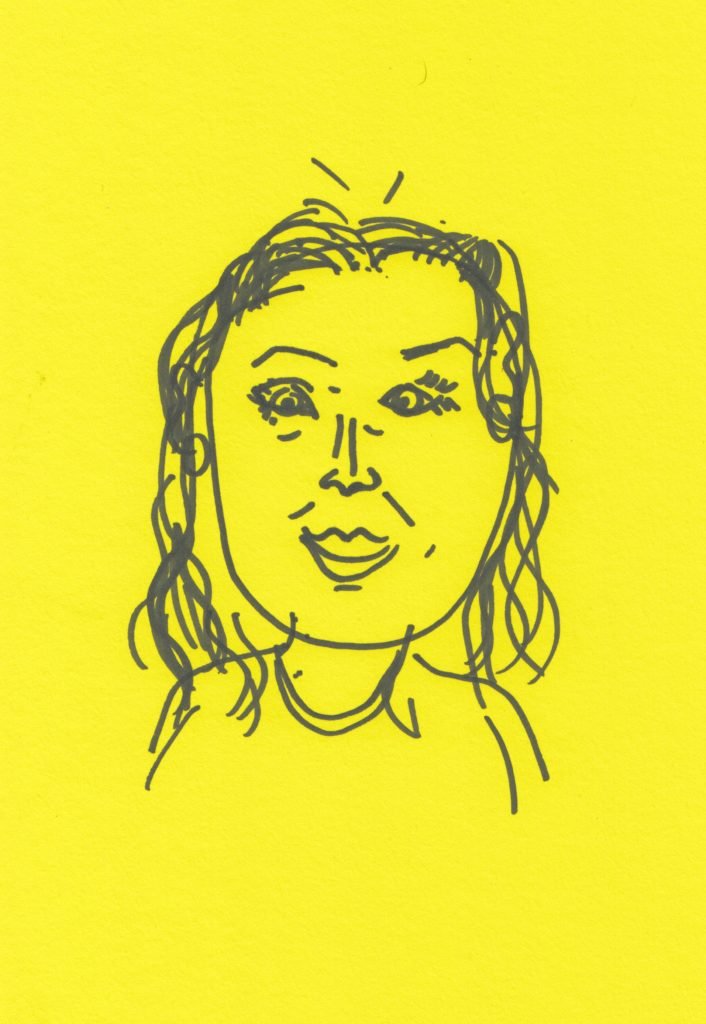
08 |
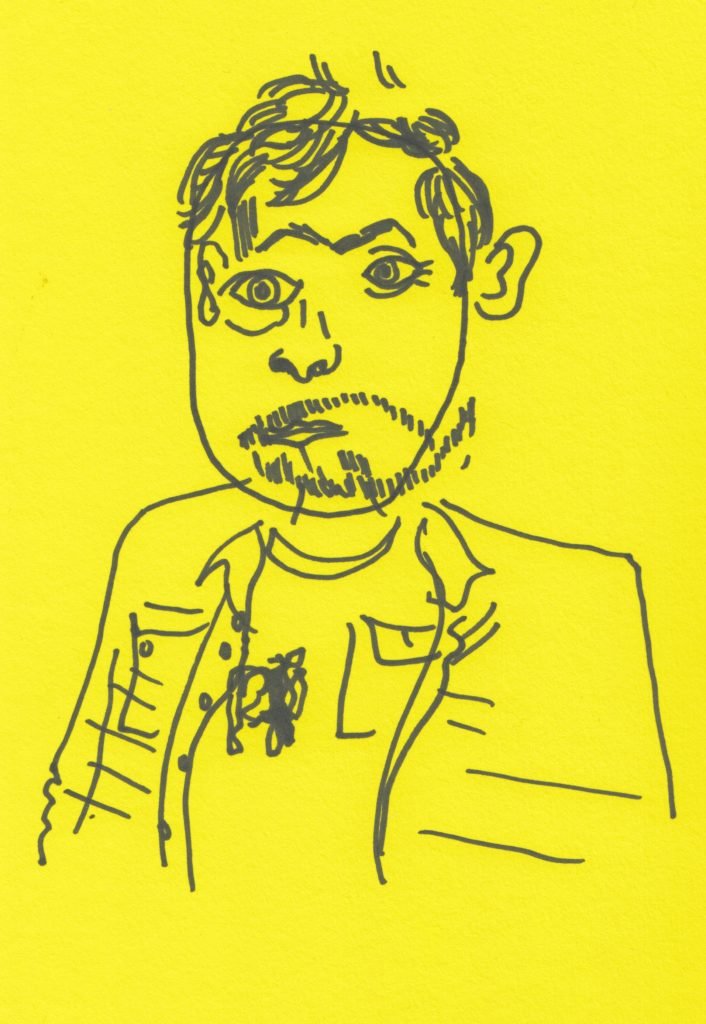
09 |

10 |
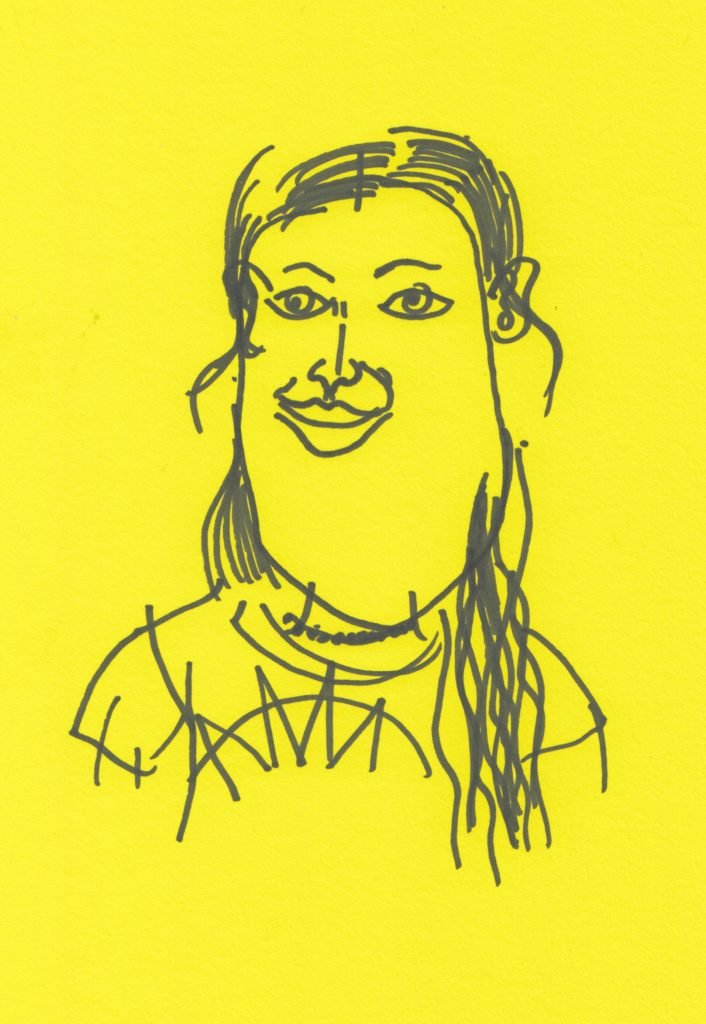
11 |
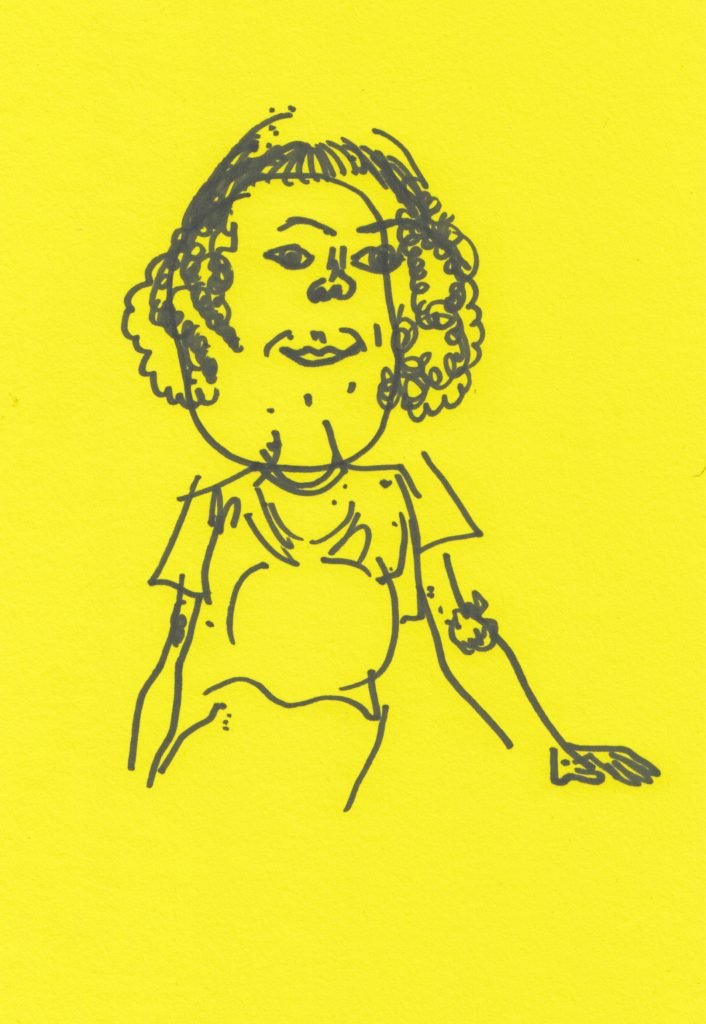
12 |
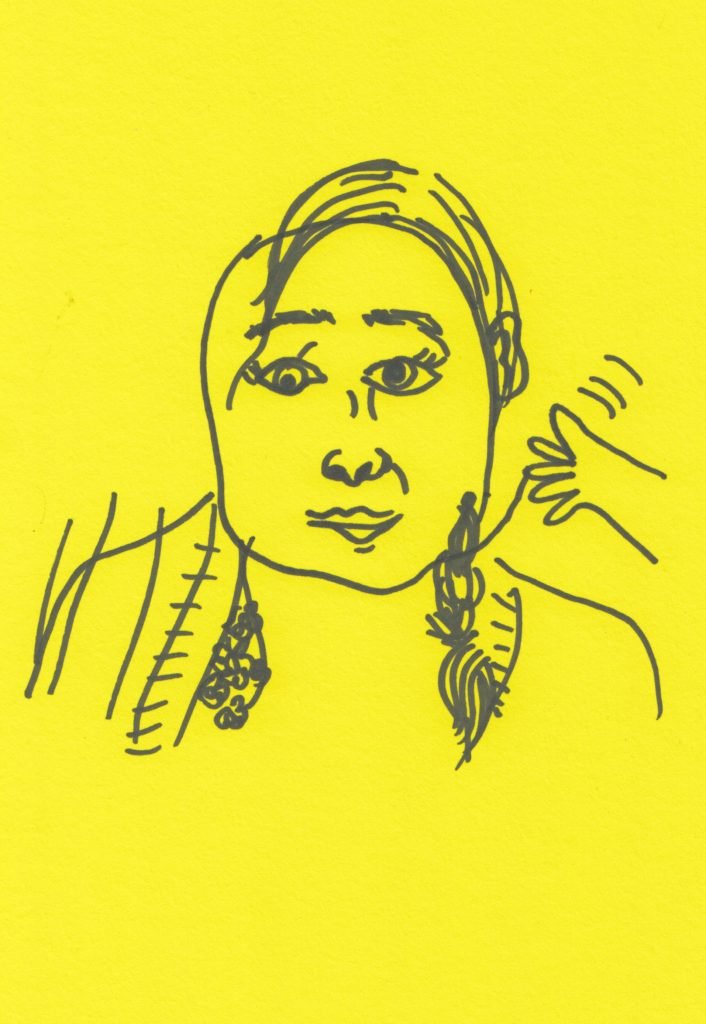
13 |
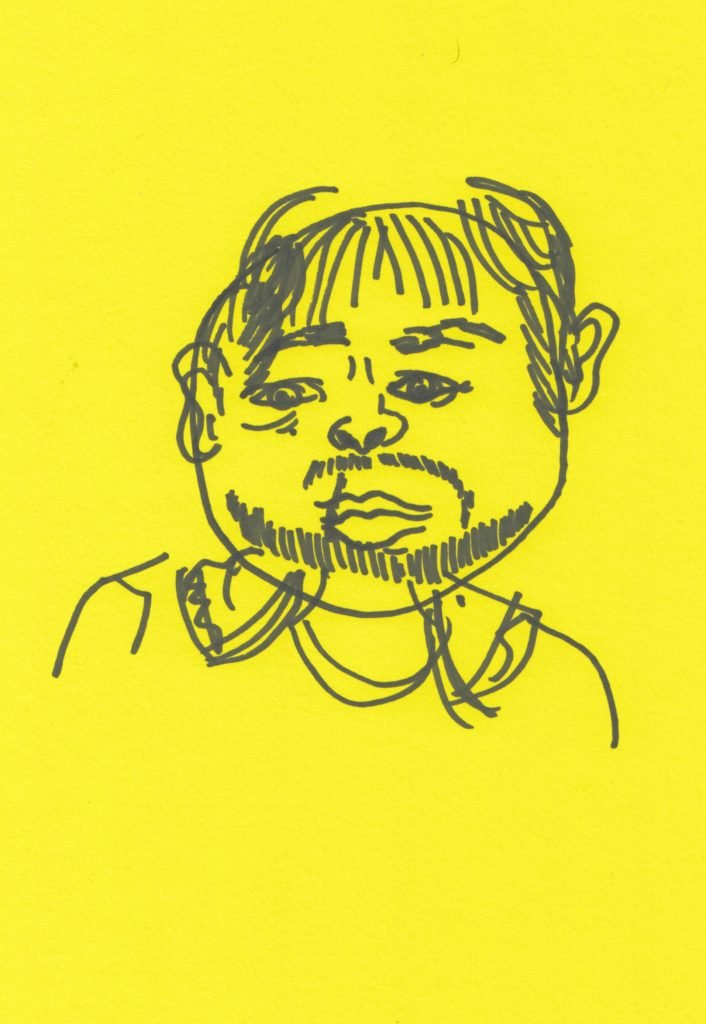
14 |
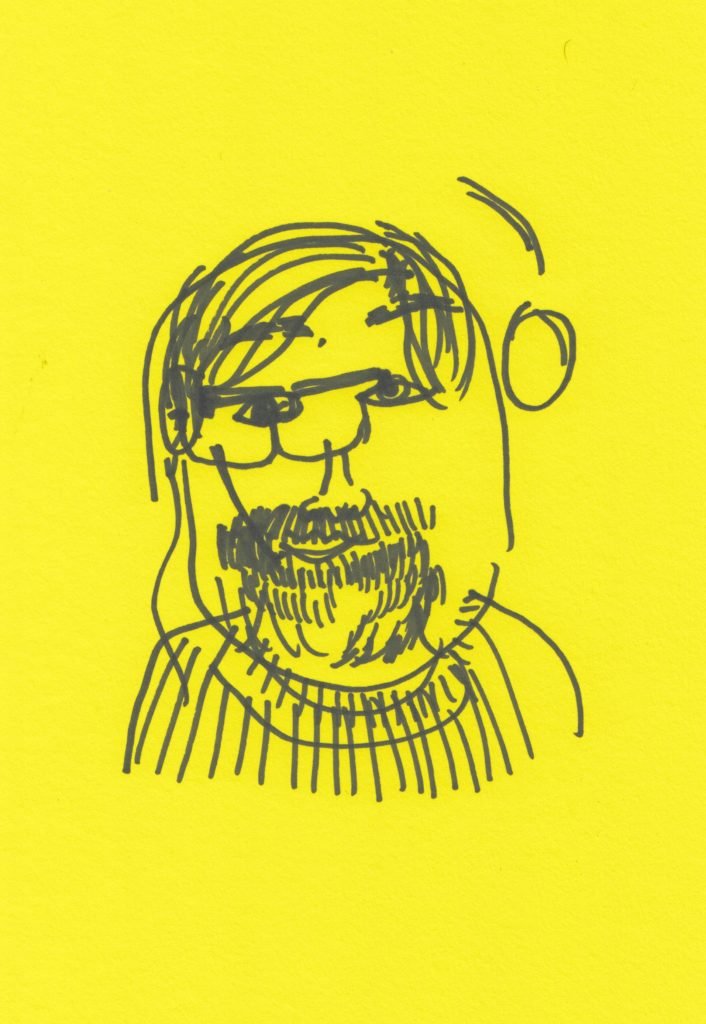
15 |
Blind Portrait Biographies
01
Vicki, 44, Teacher
Vicki is productivity personified. A self-proclaimed busy person, she is learning to value spare time for herself amongst continuing to work her usual full-time hours, where she has adapted to remote teaching. She fears returning to the classroom, both the practicalities of enforcing social distancing but also how to get the significant numbers of students who have not engaged or accessed online learning to adjust and comply to studying when back in school. As if working as a teacher with new challenges and stresses wasn’t enough, she is also providing care and transport for a shielding family member, delivering activities via Zoom to her regular Boys Brigade group, and has even found time to take up a new hobby –learning the Saxophone (a moment of solidarity for her neighbours). When asked about any unexpected positives to come from lockdown Vicki shares she has “got used to a slower pace.”
02
Jo, 50, Foster Carer
With both a 3 month and 7 month old at home and no visitations for solace, life in lockdown for foster carer Jo means she always has a baby on the hip. “It’s a lot of work,” she admits, but during our chat it is clear Jo has always prioritised family time and is succeeding in making the best of what she has. She has learnt to be more resourceful and creative, whether that be finding solutions for outgrown baby-grows (“I just cut the feet off and now use it for the messy feedings”), or making her own fun for her family (“three sheets and a trampoline and you’ve got a den!”) Her advice to others: “Be more mindful – we don’t need all that new stuff, that new product. We can make do and mend. It’s not about having and wanting, it’s about being and doing.”
03
Haleema, 23, Admin/Pastoral Team at a Secondary School
In our short 15 minute conversation, Haleema touches upon numerous effects of lockdown we have all experienced, from confusing information surrounding work and rules (“they tell us one thing one minute, and another the next”) to just a general sense of life on pause such as setting back travel plans. She misses her family the most, the separation between her and her brother particular notable, having recently lost their mother. Despite this, Haleema exudes positivity, making the chat one of my easiest and friendliest (she even demonstrated her budding juggling skills!). For post-lockdown life, Haleema still plans to see the world, promises to make more of an effort with friends, and says we need more connection in our communities – and if this time has kickstarted this, then we need to push it even further. Her advice is refreshingly simple – “just be nice to each other.”
04
Andy, 47, Data Migration Analyst
Furloughed from his software job, Andy represents the portion of the population who have suddenly been given the time they’ve always wanted to tackle that neglected to-do list of DIY and garden odd jobs, but under a cloud of uncertainty and worry. Unsurprisingly, Andy’s main fear is losing his job as work disappears and projects get cancelled. He misses the normal stuff; the spontaneity of having a coffee and cake at Thieving Harrys, and browsing shops for books and vinyl. Instead, he now walks 4 miles a day to replicate his lost walk to work. “I’ve enjoyed walking with no destination” he shares, adding that he has found new places and routes on his doorstep he didn’t previously know of, and has also revisited childhood streets. For life after the pandemic, Andy thinks working from home should be more common and people can rely less on cars, but in the meantime his advice is to “keep positive, keep active, it will all end at some point.”
05
Becca, 27, Therapy Assistant and Ceramic Artist
Sheffield-based Becca is currently experiencing limbo on top of the one we are all already living in. Two weeks before lockdown, she was excited to begin a new role at a children’s hospital. “I’m treating no patients” she tells me as she explains that wards, staff and resources have been redirected for Covid-19. Whilst she is been kept very busy, two months after arriving she is yet to start or settle into her actual role of treating child patients. Work aside, she misses her best friend, the pub, and access to her studio where she works on beautiful narrative-adorned ceramics. Motivation to draw and create has understandably waned for her, however, not having to rush means she is now experimenting on thinner, more delicate work when inspiration strikes.
06
Gaynor, 64, Retired Nurse
Gaynor’s biggest fear goes beyond the immediate impact of lockdown, and instead is a reimagined future where forms of social distancing are going to be normal long term –especially if a vaccine breakthrough is an unknown, distant goal. She fears the impact on children, potentially growing up with no freedom for the foreseeable future, where everything is controlled for them. Off to a rather a sombre start talking about infection control, Gaynor’s bubbly personality lifts the mood as she lists the positives she has experienced, including meeting her new grandson Albert George over video chat and observing better community spirit. “It’s like when I was a little girl,” she says, adding that for life post-lockdown we need to “go out and grab it, jump on it whilst it’s still fresh.” She hopes we can maintain the new found community spirit, such as encouraging volunteer work, because otherwise in a few years people will forget how it was, our increased considerateness resigned to a footnote in history books.
07
Jack, 25, Caravan Builder
Talking to Jack I am left inspired by his mindfulness, self-awareness, and appreciative nature. Having lost his father in January and taking time off to grieve, Jack returned to work in March feeling strange – “it didn’t feel like normal life, like there wouldn’t be normal life.” And it seems he was right. A pandemic breaks out and a fortnight later he is furloughed. He expresses how very lucky he is, not only having gained extra space and time to heal, but that the government has his back as furlough covers his mortage payments. He raises a salient point that despite his appreciation, the mammoth scale of support given sheds light on the fact that if it is possible for this, surely support can be distributed towards struggling foodbanks or implementing better living wages. “If this can happen, why can’t fixing the previous issues?” he offers, hoping we can hold the government accountable moving forward. Self-improvement now fills Jack’s time, with challenges including a week running a 5k every day, another running 10k every day, and completing a half marathon. After applauding his efforts, he reassures me that there is no pressure to “learn a new language or be productive during all of this” – sitting on the sofa eating snacks is fine too. Jack asks that everyone reminds themselves to be patient, they will be able to have “an inappropriately long hug sometime in the future. Things are going to get better, not normal, but better.”
08
Charlotte, 26, Public Historian
Now working from home, Charlotte misses the face-to-face engagement so crucial to her work. She usually embeds herself in communities for her research and consultation; “I like to just go sit and talk to people. Go and sit next to them in coffee shops or at a bus stop and just talk.” She comments on her day to day feeling planned now, missing the spontaneity of mooching around town and wandering for the sake of it. She’s also disappointed in the government response, adding “it’s exposed the cracks. I hope people realise their [political] actions over the past few years have made things worse.” The main trade-off for her change in work environment is saving money which would usually be spent on commuting. When asked about the main positive to come from lockdown the answer was straightforward and envied: the new pizza oven in the garden. Petrol money well spent.
09
Richard, 32, Teaching Assistant
I ask all of the volunteers if they have re-evaluated or prioritised anything during this time of restrained freedom, whether that be goals, plans or decisions. The core of my chat with laidback Richard revolves around this theme of reflection; “I never realised how lucky I am. I don’t take anything for granted.” Currently working shifts in rotation with other teaching assistants, Richard’s extra free time has given him the space to appreciate his life. He is more in touch with his friends and family now more than ever, making a conscious effort to virtually check-in daily or schedule occasional quiz nights and drinks, musing that it’s weird to wake up with a hangover when you haven’t even left the house. He says he has never appreciated having a garden before, and definitely never cared for birds. Apparently, he’s spent a fortune on bird feed, and making his own is the natural next step. “I’ve never been interested in birds but now I’m watching the robins. I will find myself standing at the window in my dressing gown like a proud mum.”
10
Vanessa, 49, Plumbing Tutor
For Vanessa and many of the working population, transitioning to working from home has raised some serious thoughts surrounding work life balance. She has swapped a 5am alarm and 2.5hrs worth of commuting a day for a 2.5 second walk to her desk and numerous personal gains. She now has time to conquer many UFO’s (unfinished objects, apparently, in quilter talk) and her screen time has massively reduced. With energy to spare, post-work “mindless scrolling” has been replaced with spending free-time more deliberately. She’s evaluating finding work closer to home, and how to create more time for herself in the future. A sociable person, she misses her large family gatherings, going to the pub, eating out and the human aspect of teaching –“I like to teach. My favourite part is witnessing the student’s lightbulb moments.” As she hopes to strike a balance in the future, for life after lockdown she wishes everyone the same. “Hopefully we can all take more time for ourselves and not take work so seriously. Enjoy this time whilst you can. We will all be back in the rat race very soon.”
11
Kathryn, 23, Museum Assistant and Poet
During our chat, Kathryn reflects on what she misses and fears, and what we should learn and change. Amongst worrying about financials, her parents getting ill, and the disastrous government response of reacting too slow, her largest fear is simply other people. “I worry people want to return to normal too quickly” she tells me, remarking on the madness that is KFC reopening before we know we can safely see our own families. She misses her family the most, as well as the freedom to visit places of natural beauty. These are reflected in her thoughts of what we should learn. “We need to learn to slow down” she advises, believing we need to prioritise connection with our families but also our environment, protecting the natural world. For now, Kathryn’s advice is to “keep going and don’t be too hard on yourself. There’s no pressure to be productive, just appreciate the simple things – whether that be the fact it’s a sunny day or looking forward to a hot bath.”
12
Karla, 37, Bar Owner of 80 Days Bierhaus
Owner of two businesses, mother to a toddler, and 31 weeks pregnant, Karla’s concerns are plentiful and justified. By far her biggest worry is money. Her family’s livelihood is provided by the bar and shop which she owns with her husband, and raises new questions on the daily. Questions from “When will we re-open? How long will restrictions last?” to “What are we even paying for?”, when explaining that their insurance won’t pay out despite ‘closure due to infectious diseases’ been included in the original terms. They face a future of muddling through furloughing, social distancing and reduced capacity concerns. Yet amidst the stress, a new perspective has formed. The family is spending more time together than they ever have now Karla and her partner are not taking turns running the businesses. “Beatie has even asked ‘Why Daddy is home?’ at times,” she shares, going on to say her partner has never been there to put her daughter to bed before. “We’re definitely not going to kill ourselves to work anymore. We’ve had more time as a three than ever.” Karla’s message to people reading at home is direct: “Don’t vote Tory! Do yourself a favour!”
13
Samantha, 33, Stay At Home Mum
Drawing Samantha was the funniest portrait to complete, as the tiny hands of her daughter grab at and contort her face providing me an extra challenge. Samantha is patient and resilient, the separation of social distancing been by far the biggest impact on her life. Her partner works away at lengths at a time, leaving her isolated with toddler Penny alone. “Normally we get out and do something every day,” she tells me, explaining that with no partner, grandparent visits, or children’s playgroups to attend, she doesn’t get a break from parenting. Their current form of entertainment is walking daily, where they are discovering green spaces nearby which they didn’t know about. Her main fear is the unknown. “It’s the uncertainty, how it will effect everything in our lives – there are just so many repercussions that we don’t yet know. It’s a researcher’s dream – think how many theses are going to be written about this.”
14
Adam, 27, Play Park Worker
Furloughed from two jobs, Adam is taking a slower pace of life in his stride. “I’m really fortunate to live with my parents,” he says as we discuss missing contact with family members. Not taking his current situation for granted, he plans to spend more time with his family in the future. He is one of the few volunteers I drew who misses work the most – “I miss acting like a big kid! Work is my chance to be silly.” Young at heart, Adam’s swapped his role at an inflatable play park for different kinds of fun. His new hobby is buying Robot Wars toys off eBay, and joining weekly activities with his theatre group such as online quizzes, dance classes and learning to make raspberry and white chocolate cheesecake. “I don’t think I’ve come out with any words of wisdom recently…but my advice would be to be patient. We will come out stronger.”
15
Matt, 33, Software Developer
From our chat, Matt has seemingly transitioned to the new way of things effortlessly. He’s working from home and therefore spending more time with his partner, his board game nights have been swapped with online games, and his twice-weekly cinema visits have been replaced with streaming an awful lot of Disney films. “I’m filling in the gaps of my childhood” he says, adding that even though he isn’t struggling per se, the nostalgia and uplighting storylines provide light relief when the negative feelings creep in. Whilst explaining the impact of the virus and lockdown on his life, he cares more about the impact it’s had on others; “all of this has highlighted that the people who are vital to the running of this country are the lowest paid.” He hopes going forward people in essential work get the rewards, recognition and security they deserve (he also hopes his new found meal-planning and dog walking routine stick around.) His advice to others? “Don’t underestimate the power of Disney films.”
About the work
Through a one on one drawing project, artist Lydia Caprani has created a candid snapshot of the public’s thoughts, hopes and fears surrounding coronavirus and life in lockdown. Fifteen volunteers were randomly selected to participate in having their blind portrait drawn (drawn by not looking at the paper) over webcam, alongside a friendly chat about their current circumstances. With wobbly and unpredictable drawings, the project’s focus is less about the artistic outcome, but instead a catalyst for a positive experience, creating connection during contact-starved lockdown. The drawings are paired with short writings based on the conversations had, creating a small window into the personal uncertainties we face.
About the artist
Lydia Caprani is a Hull based graphic artist inspired by vernacular design and folk art. She is interested in decoration being applied to all; stemming from a personal conviction that societies have always used visual forms to express cultural identity, communicate and create. Far from just being surface or superficial, decoration is deeply rooted in folk traditions. Through pattern, type and decorative interventions, she explores these ethnographic themes with people and spaces. Additionally, she works on projects as a community artist, muralist, and graphic designer.
Artist links
